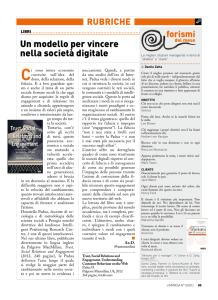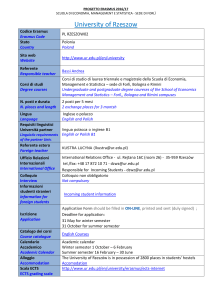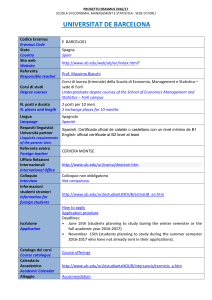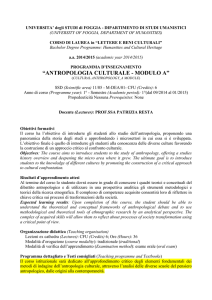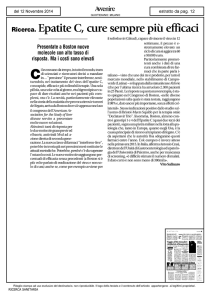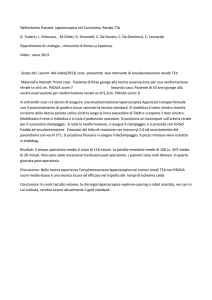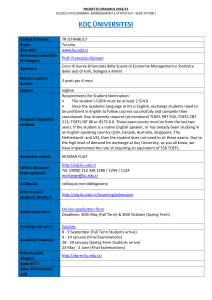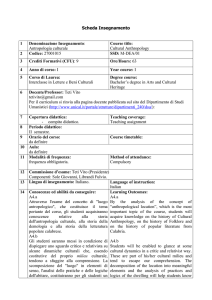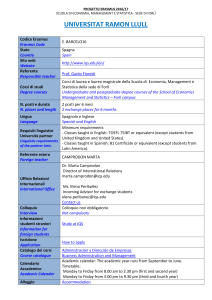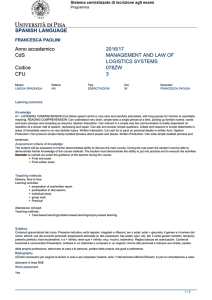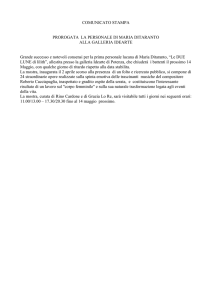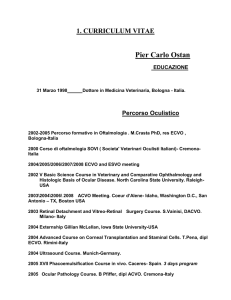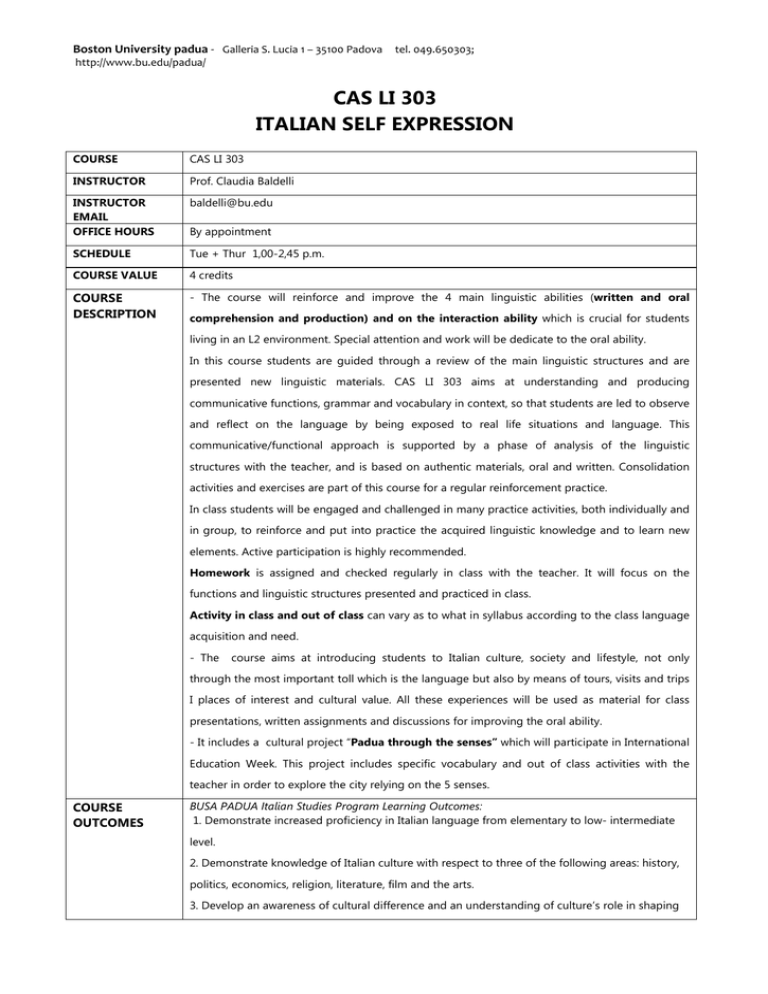
Boston University padua - Galleria S. Lucia 1 – 35100 Padova tel. 049.650303;
http://www.bu.edu/padua/
CAS LI 303
ITALIAN SELF EXPRESSION
COURSE
CAS LI 303
INSTRUCTOR
Prof. Claudia Baldelli
INSTRUCTOR
EMAIL
OFFICE HOURS
[email protected]
SCHEDULE
Tue + Thur 1,00-2,45 p.m.
COURSE VALUE
4 credits
COURSE
DESCRIPTION
- The course will reinforce and improve the 4 main linguistic abilities (written and oral
By appointment
comprehension and production) and on the interaction ability which is crucial for students
living in an L2 environment. Special attention and work will be dedicate to the oral ability.
In this course students are guided through a review of the main linguistic structures and are
presented new linguistic materials. CAS LI 303 aims at understanding and producing
communicative functions, grammar and vocabulary in context, so that students are led to observe
and reflect on the language by being exposed to real life situations and language. This
communicative/functional approach is supported by a phase of analysis of the linguistic
structures with the teacher, and is based on authentic materials, oral and written. Consolidation
activities and exercises are part of this course for a regular reinforcement practice.
In class students will be engaged and challenged in many practice activities, both individually and
in group, to reinforce and put into practice the acquired linguistic knowledge and to learn new
elements. Active participation is highly recommended.
Homework is assigned and checked regularly in class with the teacher. It will focus on the
functions and linguistic structures presented and practiced in class.
Activity in class and out of class can vary as to what in syllabus according to the class language
acquisition and need.
- The
course aims at introducing students to Italian culture, society and lifestyle, not only
through the most important toll which is the language but also by means of tours, visits and trips
I places of interest and cultural value. All these experiences will be used as material for class
presentations, written assignments and discussions for improving the oral ability.
- It includes a cultural project “Padua through the senses” which will participate in International
Education Week. This project includes specific vocabulary and out of class activities with the
teacher in order to explore the city relying on the 5 senses.
COURSE
OUTCOMES
BUSA PADUA Italian Studies Program Learning Outcomes:
1. Demonstrate increased proficiency in Italian language from elementary to low- intermediate
level.
2. Demonstrate knowledge of Italian culture with respect to three of the following areas: history,
politics, economics, religion, literature, film and the arts.
3. Develop an awareness of cultural difference and an understanding of culture’s role in shaping
Boston University padua - Galleria S. Lucia 1 – 35100 Padova tel. 049.650303;
http://www.bu.edu/padua/
beliefs and practices.
4. Develop new perspectives on one’s own culture and an ability to think critically about one’s
own values and beliefs.
METHODOLOGY
It is a course in an immersion context abroad which aims at presenting new communicative
functions, grammar and vocabulary, so that students are led to observe and reflect on the
language by being exposed to real life situations and language. This communicative/functional
approach is supported by a phase of analysis of the linguistic structures with the teacher, by
consolidation activities and exercises for a regular reinforcement practice.
Linguistic structures are always presented in context, explained and analyzed together with the
teacher. After that a phase of rule implementation begins.
The didactic approach is flexible and stimulates to the observation and the analysis on the
language by activating the linguistic knowledge on the part of the students. Reflections on the
language are shared in class but guided and confirmed by the teacher so that the students
themselves can discover language mechanisms. This effort guarantees a stronger and deeper
acquisition of language structures and enables the students to use the language more
authentically and naturally.
Homework is assigned and checked regularly and focuses on the functions and linguistic
structures presented in class.
COURSE
MATERIALS
- An especially prepared copy-pack complete with grammar rules,
exercises, texts, vocabulary and communicative functions.
- handouts to integrate the textbook
- Materials needed for class activities and didactic games will be provided during the course
- Notes taken in class and power points prepared by the teacher are part of the course
materials
SITOGRAPHY
ASSIGMENTS
-
http://www.adgblog.it/category/lingua/italiano-a1-a2/
-
http://www.impariamoitaliano.com/
-
http://www.scudit.net/mdindice.htm
-
http://www.loescher.it/
-
http://www.almaedizioni.it/it/almatv/
-
http://www.loescher.it/lawebtv
In addition to homework, the students ‘ progress will be evaluated with:
•
3 language texts to be done in class,
•
3 written composition to be done at home and sent via email to the teacher not later
that 6.00 p.m. of the due date.
1.
•
3 oral presentations in class
•
1 mid-term exam, written and oral
•
1 final exam, written and oral.
EVALUATION CRITERIA
Boston University padua - Galleria S. Lucia 1 – 35100 Padova tel. 049.650303;
http://www.bu.edu/padua/
Participation in
class and
homework
20%
Language
tests
Oral presentations
Written
compositions
Midterm and
final exam
20%
20%
20%
20%
Participation: punctuality, active participation in class with observations, questions, discussions; carefulness and
precision in homework and study at home; improvement in the language ability as to the beginning of the course;
Language tests: they are based on the topics analyzed in class and specified in the syllabus.
Oral presentations: can be of several typologies, ranging from role-plays to monologues. They can be integrated with
power-points and pictures but cannot include written parts. In Oral presentations the teacher evaluates: vocabulary
25% (how rich, varied and appropriate); accuracy in the use of grammar structures 25%; fluency 25%; cohesion and
coherence 25% (linking of sentences and paragraph; coherence in meaning).
Written compositions: have to be Garamond 12, double spacing, 2 and a half pages. They must be sent as an
attachment to the teacher by 9.00 p.m. of the due date ([email protected]). In the attachment students must write title,
date, name. In written compositions the teacher evaluates: vocabulary 25% (how rich, varied and appropriate);
accuracy in the use of grammar structures 25%; content 25%; cohesion and coherence 25% (linking of sentences
and paragraph; coherence in meaning).
Final and midterm exams: they are composed of a written and an oral part:
Written part: linguistic test +
written comprehension (midterm)
written production (final)
Oral part: d i a l o g u e w i t h t h e t e a c h e r ( i n t e r a c t i o n ) +
a monologue based on one of the characters of the book MA LE STELLE QUANTE SONO (midterm);
summary of the book and analyses of a specific aspect (final)
Boston University padua - Galleria S. Lucia 1 – 35100 Padova tel. 049.650303;
http://www.bu.edu/padua/
Boston University padua - Galleria S. Lucia 1 – 35100 Padova tel. 049.650303;
http://www.bu.edu/padua/
CS= comprensione scritta; CO: comprensione orale; PS: produzione scritta; PO: produzione orale
DATA
Lezione 1
3 settembre
STRUTTURE LINGUISTICHE E
COMUNICATIVE
Presentazione del corso; ripasso e pratica
concordanze articolo/nome/aggettivo (con
power-point: es orale)
ATTIVITA’IN CLASSE
ATTIVITA’ PER CASA/COMPITI
ATTIVITA’ su concordanze; collocazioni e usi con il
verbo AVERE (file)
http://www.youtube.com/watch?v=60RIaqfAC9Y
(saluti)
Scrivi una frase con ogni collocazione del
verbo AVERE: usa tempi e soggetti
diversi; pratica l’accordo usando i colori
ATTIVITA’ CO: “Cosa conosci dell’Italia”;
http://www.youtube.com/watch?v=4FrswC7tyrc
(grazie, prego, per favore)
Lettura libro;
scrivi 8 frasi usando diversi modi per dire
grazie, per favore e prego.
PROVE ED
EVENTI
FUNZIONI: salutare, rivolgersi ad una persona:
Lezione 2
8 settembre
Lezione 3
10 settembre
Ripasso e pratica pronomi personali
diretti/indiretti/riflessivi; verbo piacere, bastare,
mancare, servire
FUNZIONE: porre domande appropriate con
aggettivi e pronomi interrogativi; grazie, prego,
per favore
ripasso e pratica passato prossimo; avverbi di
frequenza
PO: ANALISI LIBRO LETTURA
ATTIVITA’ a coppie sugli avverbi di frequenza;
praticare la domanda quanto spesso/quante volte?
Po1: role-play
FUNZIONE: interagire in contesti quotidiani
cosa dico quando…..(parte 1: mi
scusi/scusami/permesso(mi dispiace....)
11 settembre
Lezione 4
15 settembre
Lezione 5
17 settembre
FUNZIONE: la forma di cortesia
Ripasso e pratica imperfetto e passato
prossimo coi connettivi
FIELD TRIP TO PADUA SURROUNDINGS
CO: audio ”Un dialogo”
Studia le forme dell’imperfetto
http://www.oneworlditaliano.com/gram
matica-italiana/imperfetto-italiano.htm +
http://www.oneworlditaliano.com/verbiitaliani/verbi_irregolari_imperfetto_indica
tivo.htm
ATTIVITA’ CO: canzone “Eri Piccola” di F. Buscaglione
Ripassa i principali verbi con
PO: ANALISI LIBRO LETTURA
preposizione
Lezione 6
FUNZIONE: descrivere persone +qualche
aggettivo per descrivere il carattere
Il trapassato prossimo
Verbo FARE:
Ripasso e pratica ausiliari per il passato
prossimo: essere e avere; verbi con doppio
ausiliare finire, cominciare;
Studia espressioni con verbo FARE e
Compo 1
Boston University padua - Galleria S. Lucia 1 – 35100 Padova tel. 049.650303;
http://www.bu.edu/padua/
http://www.youtube.com/watch?v=fOKb_IDSzw4
22 settembre
FUNZIONE: raccontare eventi passati con
connettivi temporali
Lezione 7
24 settembre
Congiuntivo presente
DARE
PO: racconta la storia (usare i 3 tempi passati
indicativi) di The Paperman: analisi del lessico
necessario in previsione dell’esercitazione su uso
tempi passati.
PO: ANALISI LIBRO LETTURA
CO. Video “La Piazza” da Italia dal Vivo
Quiz 1
25 settembre
28 settembre
Lezione 8
29 settembre
CONTROLLO DELL’ERRORE: sapere e conoscere
ONE DAY FIELD TRIP BELLUNO AND VAJONT, PADUA AND VENICE PROGRAMS
CACCIA AL TESORO PER PADOVA
Imperativo diretto VOI vs imperativo esortativo VIDEO: per praticare imperativo e scansione
Ripasso regole comparativo con video
(noi); FUNZIONE: descrivere un procedimento
temporale.
http://www.youtube.com/watch?v=vx20
WsbvgAI
Lezione 9
1 ottobre
Congiuntivo passato; qualche espressione
idiomatica
Lezione 10
6 ottobre
FUNZIONE: interagire in contesti quotidiani
cosa dico quando…..(parte 2:
congratulazioni/altrettanto....)
Che e di nelle frasi comparative e superlative;
cvomparativi e superlativi iregolari
Lezione 11
8 ottobre
I pronomi relativi I parte (cui, che);
altre espressioni idiomatiche;
PO: ANALISI LIBRO LETTURA
ATTIVITA’ CS, L’Attenzione + domande di
comprensione
VIDEO: BUONO E CATTIVO:
http://www.youtube.com/watch?v=B9NOfNg-akk
Fai una breve ricerca sui dialetti italiani,
orale.
Compo 2
Attività PS/PO: crea definizioni con l’uso dei relativi
PO: ANALISI LIBRO LETTURA
FUNZIONE: dare definizioni
13 ottobre
Lezione 12
20 ottobre
Lezione 13
22 ottobre
BBBB: bene, bravo, buono, bello; connettivi per
scansione temporale
FUNZIONE: esprimere gusti e preferenze
Il congiuntivo nelle frasi superlative; il
più/meno; -issimo; molto + aggettivo;
aggettivi enfatici
MIDTERM: ORAL AND WRITTEN
ATTIVITA’ PO: Power Point in classe per esprimere
gusti e preferenze
CO, video: “I giovani e il divertimento”; discussione
aperta sui giovani e il divertimenti in USA vs Italia
PO 2
Boston University padua - Galleria S. Lucia 1 – 35100 Padova tel. 049.650303;
http://www.bu.edu/padua/
Lezione 14
27 ottobre
FUNZIONI: esprimere gradi di preferenza
Condizionale presente
FUNZIONI: fare richieste cortesi; dare
suggerimenti; esprimere intenzioni
VISIT TO THE
MUSEO
DELL’EDUCAZIO
NE, 9.00-11.00
tbc with cas li
211
ATTIVITA’ PO: crea role-play in classe per praticare le
funzioni di oggi
PO: ANALISI LIBRO LETTURA
Video su andare e venire
http://www.youtube.com/watch?v=iWHECqb6cvo
CONTROLLO DELL’ERRORE: Andare vs venire
23, 24
ottobre
Lezione 15
29 ottobre
Lezione 16
5 novembre
2-DAY PROGRAM TRIP - MILANO
congiuntivo imperfetto e la frase ipotetica
della possibilità;
FUNZIONI: proporre/accettare/rifiutare
Imperativo indiretto TU;
FUNZIONI: descrivere un oggetto
Lezione 17
10 novembre
Lezione 18
12 novembre
Lezione 19
17 novembre
CONTROLLO DELL’ERRORE: portare vs
prendere; trovare vs scoprire
aggettivi e pronomi indefiniti:
molto/poco/troppo/abbastanza;
Ripasso forma progressiva; Il gerundio vs frase
relativa;
FUNZIONE: interagire in contesti quotidiani
cosa rispondo quando…..? (parte 2:
anch’io/neanch’io/anche a me/ a me no….)
aggettivi e pronomi indefiniti;
FUNZIONE: interagire usando l’imperativo di
cortesia
Il SI impersonale e passivante; verbi
impersonali
FUNZIONE: espressività del linguaggio orale:
gestualità ed elementi dialogici
CO: 2 canzoni di Lucio Battisti
Attività PS su cong imperf e condizionale (gioco: se
fossi…….);
ATTIVITA’ CO: canzone Teorema di M. Ferradini (in
classe)
PO: ANALISI LIBRO LETTURA
PO: flashcards: descrivi un oggetto
CS: usa un dizionario o internet per
capire come si usano in italiano i verbi
TROVARE e SCOPRIRE;
CS: Lingua e Dialetti, riordino del testo (+
esercitazione)
Attività CO: testo audio con scheda comprensione:
Spazio Civiltà
PO: ANALISI LIBRO LETTURA
Attività PO: crea indovinelli (si impersonale e relativi)
CS: video sui gesti italiani
Prepara: istruzioni per un gioco a carte
(imperativo/si impersonale);
Quiz 2
Boston University padua - Galleria S. Lucia 1 – 35100 Padova tel. 049.650303;
http://www.bu.edu/padua/
20 novembre
Lezione 20
24 novembre
i pronomi relativi II parte (che, chi);
CONTROLLO DELL’ERRORE: qualcosa/niente da
vs qualcosa/niente di
25 novembre
Lezione 21
26 novembre
Lezione 22
1 dicembre
Lezione 23
3 dicembre
Frasi subordinate: alcuni connettivi
FUNZIONE: descrivere luoghi
Riconoscimento di tutte le funzioni di CI; NE in
combinazione con misurazioni di quantità
specifiche (ne ho comprate due scatole);
misurazioni di quantità con preposizione DI
semplice
FUNZIONI: espressività nel linguaggio orale: i
segnali discorsivi
condizionale passato;
CONTROLLO DELL’ERRORE anche; infine, alla
fine di, finalmente;
Lezione 24
10 dicembre
17 dicembre
FIELD TRIP TO FERRARA, Renaissance city
Attività CO: canzone “Mi sono innamorato di te”
CS: lavora con i proverbi italiani
PO: ANALISI LIBRO LETTURA
Compo 3
VISIT TO THE MUSME – MUSEUM OF MEDICINE, UNIPD
Attività PO: idee a confronto usando i connettivi
CS: il mio rapporto con FB (pratica sui connettivi)
attività CO: testo audio (segnali discorsivi)
PO: ANALISI LIBRO LETTURA
CO: canzone “Tutto l’amore che ho” di Jovanotti
PO: praticare condizionale passato con segnali
discorsivi per desideri non realizzati
FINAL REVIEW
ESAME FINALE
Qui z 3
Boston University padua - Galleria S. Lucia 1 – 35100 Padova tel. 049.650303;
http://www.bu.edu/padua/
BEHAVIOUR IN CLASS AND AT BOSTON UNIVERSITY PADUA SITE
Arrive on time: students won’t be accepted if they arrive later that 10 minutes after the starting of the
lesson
Mobiles must be turned off
Students are not allowed to take in class food or beverages except for water.
Students must be respectful of mates and teachers. When in a foreign country, behavior and culture can be very different.
No non-excused absences are accepted, only for health reasons.
Late homework or assignments are not accepted.
BU Policies
Attendance
Boston University Padua students are expected to attend each and every class session, tutorial, and field trips required for the class. Students should note that
attendance will be taken into account by faculty when determining final grades.
Plagiarism
Simply stated, plagiarism is taking another’s work and presenting it as you own.
Dictionary definitions of plagiarism frequently include terms such as ‘theft’ or ‘steal’. Plagiarism is, in fact, intellectual theft. It is one of the most serious forms of
academic misconduct. Plagiarism committed by a student will certainly result in course failure and may result in suspension or dismissal. For more details please
see Boston University’s Code of Student Responsibilities: http://www.bu.edu/academics/resources/university-policies/
Religious Holidays
Boston University’s Office of the University Registrar states:
‘The University, in scheduling classes on religious holidays and observances, intends that students observing those traditions be given ample opportunity to make
up work. Faculty members who wish to observe religious holidays will arrange for another faculty member to meet their classes or for cancelled classes to be
rescheduled.’ See Chapter 151C of the General Laws, Commonwealth of Massachusetts.
Dott.ssa Claudia Baldelli –Fall 2015
Boston University padua - Galleria S. Lucia 1 – 35100 Padova tel. 049.650303;
http://www.bu.edu/padua/

